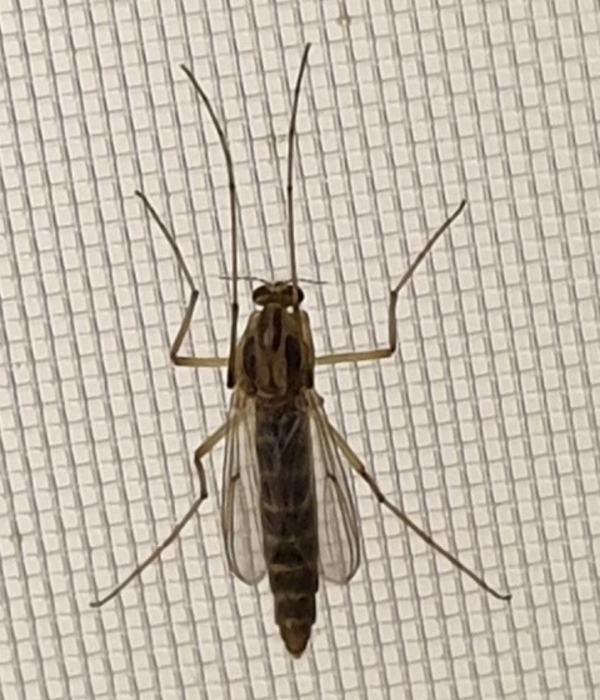Non-biting midges are the tiny flies that swarm together as thick masses around lakes and streams, annoying passers-by in warm weather. But early in a midge’s life, it lives in the water. Now, researchers reporting in ACS’ Environmental Science & Technology have observed that non-biting midge larvae accumulate contemporary pesticides from polluted water and retain the substances into adulthood. As a result, animals that eat the adult flies could consume small amounts of pesticides daily.

Credit: Alexis Roodt
Non-biting midges are the tiny flies that swarm together as thick masses around lakes and streams, annoying passers-by in warm weather. But early in a midge’s life, it lives in the water. Now, researchers reporting in ACS’ Environmental Science & Technology have observed that non-biting midge larvae accumulate contemporary pesticides from polluted water and retain the substances into adulthood. As a result, animals that eat the adult flies could consume small amounts of pesticides daily.
Mixtures of pesticides are applied to farms, forests, yards and gardens to keep nuisances at bay. When it rains, those compounds run off the landscape into nearby waterbodies, exposing underwater critters to a concoction of contaminants. For the non-biting midge, its larvae are bottom dwellers, slinking around sediments. However, after metamorphosis, the adults emerge and fly on shore and inland, becoming a major food source for spiders, frogs, birds and bats. Some emergent aquatic insects are known to accumulate contaminants, such as legacy pesticides, and retain the compounds as they pass from larval to pupal to adult stages — though potential differences between the sexes are rarely considered. And whether midges hold onto currently used pesticides into adulthood hasn’t been addressed. So, Alexis Roodt, Ralf Schulz and colleagues wanted to track multiple pesticides throughout the life cycle of female and male non-biting midges, estimating the insects’ potential to deliver these compounds to predators.
The researchers placed non-biting midge larvae into containers with sediment and water spiked with three levels of a mixture of nine pesticides. Larvae that lived in the contaminated environment for 14 days accumulated all of the fungicides and herbicides studied, and the adult flies retained most of the compounds. The researchers found that the process of metamorphosis lowered the contaminants’ levels, except for propyzamide, an herbicide which had similar levels between larvae and recently emerged flies. Adult female insects had higher concentrations of the pesticides compared to the males. But, as females mated and died, their pesticide levels generally decreased, which the researchers attribute to most of them laying eggs and transporting the compounds along to the next generation of midges. In contrast, contaminant levels remained steady for adult males from the time they emerged as flies through adulthood. Finally, the team estimated that tree swallow nestlings and two threatened bat species consume low to moderate levels of pesticides from the adult-stage flies in their diets. The researchers say that non-biting midges are a potential source of pesticides to terrestrial food webs by transferring the contaminants from water to their predators.
The authors acknowledge funding from the Deutsche Forschungsgemeinschaft (DFG, German Research Foundation).
The paper’s abstract will be available on April 20 at 8 a.m. Eastern time here: http://pubs.acs.org/doi/abs/10.1021/acs.est.1c08079.
The American Chemical Society (ACS) is a nonprofit organization chartered by the U.S. Congress. ACS’ mission is to advance the broader chemistry enterprise and its practitioners for the benefit of Earth and all its people. The Society is a global leader in promoting excellence in science education and providing access to chemistry-related information and research through its multiple research solutions, peer-reviewed journals, scientific conferences, eBooks and weekly news periodical Chemical & Engineering News. ACS journals are among the most cited, most trusted and most read within the scientific literature; however, ACS itself does not conduct chemical research. As a leader in scientific information solutions, its CAS division partners with global innovators to accelerate breakthroughs by curating, connecting and analyzing the world’s scientific knowledge. ACS’ main offices are in Washington, D.C., and Columbus, Ohio.
To automatically receive news releases from the American Chemical Society, contact [email protected].
Follow us: Twitter | Facebook | LinkedIn | Instagram
Journal
Environmental Science & Technology
DOI
10.1021/acs.est.1c08079
Article Title
Emerging Midges Transport Pesticides from Aquatic to Terrestrial Ecosystems: Importance of Compound- and Organism-Specific Parameters
Article Publication Date
20-Apr-2022




